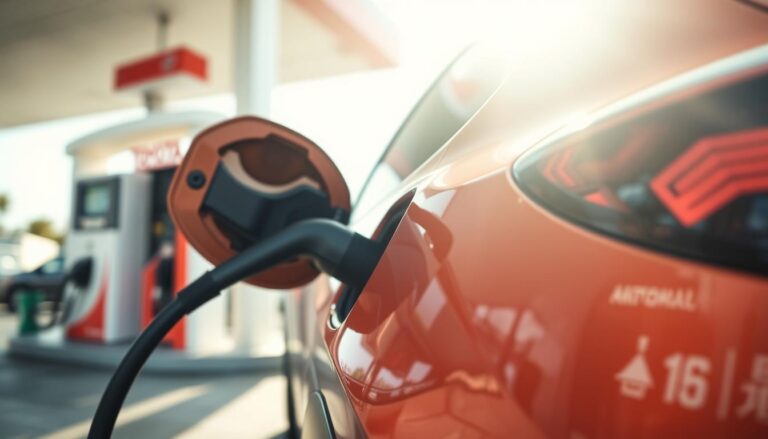For Chevy Equinox proprietors, the comprehension of accessing the gas tank is paramount for an unencumbered refueling process. The procedure entails a straightforward fuel door release mechanism.
Acquaintance with the methodology to unveil the gas tank can significantly curtail time expenditure and diminish the likelihood of frustration at the fueling station. This compendium aims to elucidate the process, ensuring Chevy Equinox proprietors are adept at refueling their vehicles with alacrity.
Key Takeaways
- Understanding the fuel door release mechanism is crucial.
- Accessing the gas tank is a straightforward process.
- This guide provides step-by-step instructions for Chevy Equinox owners.
- Properly opening the gas tank enhances the overall fueling experience.
- Following these steps can save time and reduce frustration.
Understanding Your Chevy Equinox Fuel System
The fuel system of your Chevy Equinox is integral to its functionality, necessitating a thorough comprehension. Familiarity with the system’s components and their roles is paramount for enhancing your vehicle’s performance and fuel efficiency.
Fuel Tank Location and Capacity
The fuel reservoir of the Chevy Equinox is situated at the rear, beneath the cargo compartment. Its capacity varies, spanning from approximately 14 to 19 gallons, contingent upon the model year and configuration.
| Model Year | Fuel Tank Capacity (gallons) |
|---|---|
| 2010-2017 | 19.0 |
| 2018-Present | 14.9 (FWD), 15.6 (AWD) |
Gas Cap Design and Function
The gas cap is a pivotal element, sealing the fuel tank and preventing the escape of fuel vapors. Its proper functioning is crucial for maintaining fuel pressure and averting efficiency problems.

Recommended Fuel Types for Optimal Performance
For peak performance, Chevy advocates the use of regular unleaded gasoline with an octane rating of 87 or higher for most Equinox models. Models equipped with a 2.0L turbocharged engine, on the other hand, necessitate premium unleaded gasoline with an octane rating of 91 or higher to optimize performance and efficiency.
“Utilizing the correct fuel type is imperative for preserving your vehicle’s performance and longevity. Employing a fuel with a lower octane rating than recommended can result in diminished performance and potentially harm the engine.”
Grasping the intricacies of your Chevy Equinox’s fuel system, encompassing tank capacity, gas cap design, and recommended fuel types, is critical for sustaining its performance and overall health.
How to Open Gas Tank on Chevy Equinox: Standard Method
To refuel your Chevy Equinox, you must first access the gas tank via the fuel door release button. This method is intentionally straightforward, ensuring a seamless refueling experience.
Locating the Fuel Door Release Button
The fuel door release button is situated on the driver’s side door panel or within the center console. Its design facilitates effortless access, eliminating the need for manual operation.
Step-by-Step Opening Process
To initiate the opening of the gas tank, adhere to the following protocol:
- Ensure your vehicle is parked on a level surface and apply the parking brake.
- Locate the fuel door release button and press it.
- The fuel door will pop open, granting access to the gas cap.
- Twist the gas cap counterclockwise to remove it.
Removing and Replacing the Gas Cap Properly
Upon removing the gas cap, prepare for refueling. To secure the cap, twist it clockwise until it clicks, confirming a tight seal.
Tightening Requirements
The gas cap must be tightened until it clicks. This ensures a secure fit, preventing fuel evaporation.
Cap Tether Usage
The gas cap tether serves to prevent cap loss by attaching it to the fuel door. Upon cap replacement, ensure a secure attachment to the tether.

| Step | Description |
|---|---|
| 1 | Press the fuel door release button. |
| 2 | Open the fuel door. |
| 3 | Twist the gas cap counterclockwise to remove. |
| 4 | Refuel your vehicle. |
| 5 | Replace the gas cap and twist clockwise until it clicks. |
Alternative Methods for Different Model Years
The evolution of the Chevy Equinox has introduced various design iterations, influencing the methodology for accessing the gas tank. Despite the fundamental principle’s constancy, each model year presents unique characteristics necessitating specific operational techniques.
First Generation (2005-2009) Equinox Models
The inaugural iteration of the Chevy Equinox houses the fuel door release on the driver’s side door or within the dashboard. To initiate the opening of the gas tank, one must engage the release lever, which will promptly open the fuel door.
Second Generation (2010-2017) Equinox Models
The second generation’s design simplifies the process. The fuel door release button is situated on the driver’s door or within the center console. Activation of this button will liberate the fuel door.
Third Generation (2018-Present) Equinox Models
The third generation Equinox models incorporate an advanced fuel door release mechanism. Certain models may employ a touch-sensitive release or an automatic fuel door.
Manual Release Options in Emergency Situations
In scenarios where the electronic fuel door release malfunctions, manual override options are available. For most models, manual release can be achieved by accessing the trunk or cargo area and pulling the release cable. For detailed guidance, refer to resources such as the comprehensive guide on opening the gas on other models.
| Model Year | Fuel Door Release Location | Release Method |
|---|---|---|
| 2005-2009 | Driver’s side door or dashboard | Pull release lever |
| 2010-2017 | Driver’s door or center console | Press release button |
| 2018-Present | Varies, potentially touch-sensitive | Press or touch release |
Troubleshooting Common Gas Tank Issues
Addressing gas tank malfunctions in your Chevy Equinox is imperative for a seamless driving experience. Despite its robust design, the gas tank system occasionally encounters issues that necessitate prompt resolution.
When the Release Button Doesn’t Respond
The inoperability of the fuel door release button may stem from a defective button, an electrical circuit malfunction, or mechanical failure. Inspect the fuse associated with the fuel door release and replace it if it’s blown.
Dealing with a Frozen or Stuck Fuel Door
In frigid climates, the fuel door may freeze or become immovable. Employ a mild de-icing technique or a low-temperature hairdryer to defrost it. Vigorous attempts to open the door can result in damage to the door or surrounding components.
Gas Cap Warning Light Problems
The illumination of the gas cap warning light often signals a loose or compromised gas cap. Inspect and secure the cap. Persistent illumination may indicate a more complex problem within the EVAP system.
Addressing Fuel Door Alignment Issues
Malalignment of the fuel door can hinder its functionality. To rectify this, loosen the hinge screws and realign the door properly.
| Issue | Possible Cause | Solution |
|---|---|---|
| Non-responsive release button | Faulty button or electrical issue | Check and replace fuse if necessary |
| Frozen or stuck fuel door | Cold weather | De-ice gently or use a hairdryer |
| Gas cap warning light | Loose or damaged gas cap | Tighten or replace gas cap |
| Fuel door alignment issue | Improper alignment | Adjust fuel door hinge |
Safety and Maintenance Tips for Your Equinox Fuel System
Attentiveness to safety and maintenance is paramount for the longevity and efficiency of your Chevy Equinox’s fuel system. A meticulously maintained fuel system not only augments your vehicle’s performance but also guarantees your safety on the road.
Essential Safety Precautions When Refueling
Adherence to basic safety protocols is imperative when refueling. Prior to opening the gas tank, ensure the engine is turned off and the parking brake is engaged. Vigilance against static electricity, which can ignite fuel vapors, is crucial. Discharging static electricity by touching a metal part of the vehicle before handling the gas cap is advisable.
Keeping the Fuel Door Mechanism Clean
The fuel door mechanism necessitates regular cleaning to prevent debris accumulation. Inspect the area surrounding the fuel door for any obstructions or dirt. Utilizing a soft brush or cloth for cleaning can avert operational issues with the fuel door.
When to Replace Your Gas Cap
A gas cap in disrepair or showing signs of wear can precipitate fuel evaporation and illuminate the check engine light. Regularly inspect your gas cap for wear or damage. Prompt replacement is a simple yet crucial maintenance task.
Seasonal Maintenance Considerations
Seasonal variations can impact your Chevy Equinox’s fuel system. In colder climates, ensure the fuel door mechanism remains ice-free and snow-free. During warmer months, monitor fuel evaporation rates and consider employing a fuel stabilizer if the vehicle will be stored for an extended duration.
Adherence to these safety and maintenance guidelines will ensure your Chevy Equinox’s fuel system operates with optimal efficiency and safety throughout its lifespan.
Maintaining Your Chevy Equinox’s Fuel System
The act of opening and maintaining the gas tank on your Chevy Equinox is paramount for both safety and efficiency during refueling. Grasping the intricacies of the fuel system, encompassing the fuel tank’s location and capacity, the gas cap’s design and functionality, and the appropriate fuel types, is essential. This knowledge ensures the vehicle operates at its peak performance.
Adherence to regular maintenance, such as the upkeep of the fuel door mechanism and timely replacement of the gas cap, is imperative. It prevents malfunctions like a stuck fuel door and the illumination of the gas cap warning light. Acquaintance with the procedures for opening the gas tank, including the conventional method and alternative approaches for various model years, streamlines the refueling process.
Adopting the practices detailed in this article enables Chevy Equinox owners to maintain their vehicle’s fuel system effectively. This approach minimizes the likelihood of issues and preserves the vehicle’s performance. Mastery over the gas tank opening procedure and consistent fuel system maintenance guarantees uninterrupted operation of your vehicle.
FAQ
How do I open the gas tank on my Chevy Equinox?
To access the gas tank on your Chevy Equinox, first locate the fuel door release button. This is typically situated on the driver’s side door or on the dashboard. Upon pressing the button, the fuel door will release, allowing you to pull it open and access the gas cap.
What type of fuel is recommended for my Chevy Equinox?
The owner’s manual for your Chevy Equinox will specify the recommended fuel type. Generally, most models require either regular or mid-grade gasoline. It is imperative to consult the manual for precise guidance on fuel selection.
Why is my gas cap warning light on?
The illumination of the gas cap warning light is often a result of a loose or damaged gas cap. Ensure the gas cap is securely tightened and inspect it for any signs of damage. If the issue persists, seek assistance from a mechanic or your local Chevrolet dealership.
How do I troubleshoot a non-responsive fuel door release button?
Should the fuel door release button fail to respond, first verify the integrity of the fuse associated with the fuel door release mechanism. If the fuse is blown, replace it and retest the button. If the problem continues, professional assistance from a mechanic or your local Chevrolet dealership is advised.
Can I manually release the fuel door in an emergency situation?
Yes, certain Chevy Equinox models offer a manual release option for the fuel door. Refer to your owner’s manual for detailed instructions on how to manually release the fuel door in emergency scenarios.
How do I maintain the fuel door mechanism?
To ensure the longevity of the fuel door mechanism, maintain it in a clean and debris-free state. Regularly inspect the mechanism for signs of wear or damage. Lubrication, as needed, will help maintain smooth operation.
When should I replace my gas cap?
Replacement of your gas cap is warranted if it is damaged, cracked, or no longer seals properly. A malfunctioning gas cap can trigger the gas cap warning light and may lead to decreased fuel efficiency or other operational issues.


